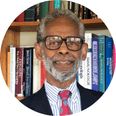Faces of FASEB
Staying with Science
 Richard (Dick) Goldsby is … what isn’t he?—a biology professor with a PhD in chemistry; an author with titles on race, AIDS, and immunology; a veterinary/medicine adjunct; and a onetime entrepreneur whose startup cloned cows with financing from a Japanese beer company.
Richard (Dick) Goldsby is … what isn’t he?—a biology professor with a PhD in chemistry; an author with titles on race, AIDS, and immunology; a veterinary/medicine adjunct; and a onetime entrepreneur whose startup cloned cows with financing from a Japanese beer company.
Let’s start with his teaching position. He applied for a job at Amherst College only because he found the Massachusetts liberal arts school’s approach to hiring minorities offensive.
“Amherst College was worried that there weren’t any Blacks who were qualified to teach science at Amherst College and, frankly, I found that insulting, so I applied for the job I have now,” he says with the hearty laugh of hindsight nearly 40 years after he joined the faculty.
It was at Amherst where he would meet Mary Catherine Bateson, a cultural anthropologist who followed in the footsteps of her world-famous mother, Margaret Mead.
In 1988, Bateson and Goldsby collaborated on “Thinking A.I.D.S.” In 2019, they teamed up again for “Thinking Race: Social Myths and Biological Realities,” published two years before Bateson’s death.
In its epoch-stretching 160 pages, the two make the point that race is more than just a social construct always devoid of any biological reality.
People must “understand race as yet another manifestation of the enormous cultural and much smaller biological variety found in our species,” they write.
The book goes on to say: “Race should be recognized as a marriage of both culture and biology that is always heavily freighted by culture and, when legitimate, has at least some biological correlates, too.”
As for his own experiences growing up in the Midwest and later earning his doctorate at UC-Berkeley, Goldsby says:
“I've been a fortunate person. I haven't encountered a great deal of racism directed at me in since—in fact, I've encountered quite the contrary. There was racism in Kansas City, but it wasn't the kind of nasty, brutal racism you might have come up against in other parts of the country.”
These days, the Thomas B. Walton Jr. Memorial Professor emeritus calls himself unemployed—that is, not exactly retired.
He continues working in a field he has loved ever since he wanted to understand the science behind the atomic bombs that obliterated Nagasaki and Hiroshima. (“Had to settle for chemistry, I was too dumb to be a physicist,” he says through his easy-and-often chuckle.)
At the moment, he and his wife, Barbara Osborne, are working on COVID-19 rapid testing at UMass, where she is Distinguished University Professor in the Department of Veterinary and Animal Sciences. He refers to Barbara, who holds a doctorate, in genetics and immunology from Stanford, as a “distinguished immunologist.”
They joined the cloning pioneer, James Robl, whose group was the first to clone a genetically engineered mammal, to develop an immunological application of his technical breakthrough.
This effort birthed Hematech, a biotech startup that produced clone cows that make human instead of bovine antibodies. This company was sold for a “nice sum.”
He’s also working on additions to his bookshelf. In addition to “Kuby Immunology,” a textbook he co-authored with Barbara and Thomas Kindt, and his Bateson books—among a couple of others—he’s working on cancer immunology chapters for a leading textbook on cancer biology.
What do the spouses of 47 years do for fun?
“Fortunately, what we do is kind of our hobbies. My wife and I, we spend most of our time at science,” he says. “Science is like literature. It's something people stay with as long as they can.”
Richard A. Goldsby, PhD, is a member of the American Association of Immunologists, a FASEB member society.